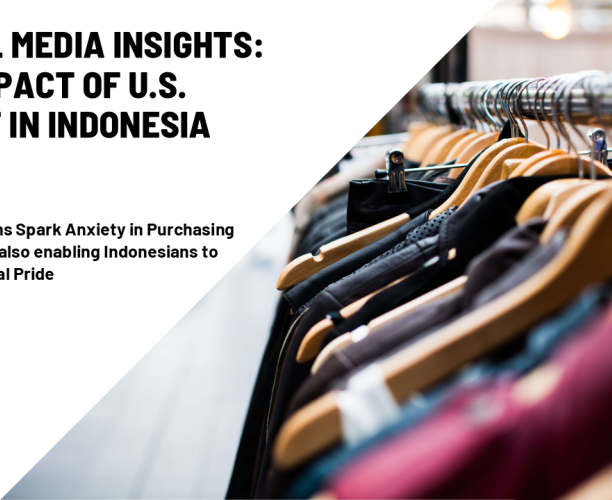

Social Media Insight: The Impact of U.S Tariff in Indonesia
Global Tariff War Triggers Dual Impact in Indonesia: Economic Concerns and Local Product Pride Rise Simultaneously
Jakarta, April 25, 2025 - Ipsos, a global market research company, recently released an in-depth social media analysis on the impact of the tariff war on Indonesia. The analysis, conducted over the period of April 1–20, 2025, revealed the complex dynamics unfolding within society, where economic concerns are intertwined with a growing positive sentiment toward local products.
Ipsos' research, utilizing Signals GenAI technology to analyze more than 250,000 social media conversations, showed that the global tariff war—likely involving the United States and China—has triggered significant concerns regarding Indonesia’s economy. One of the main impacts has been market volatility, marked by the weakening of the Rupiah against the US Dollar and a decline in stock market indices. These conditions have driven investors to seek safer investment instruments, such as gold, which has seen a rise in demand. Additionally, Indonesia’s exports, particularly in sectors such as palm oil and automotive components, have come under pressure due to higher tariffs.
"Our analysis shows widespread concern among Indonesians about the potential impact of the tariff war on the national economy. Rising prices of goods, shifts in trade routes, and effects on domestic industries reliant on global supply chains have become major concerns," said Andi Sukma, Executive Director Ipsos Indonesia.
However, amid these concerns, the report also uncovered an interesting positive trend. The tariff war has brought to light information about production practices in Western fashion industries, revealing that many luxury brands are manufactured in low-cost countries, including Indonesia. This revelation has fostered positive sentiment and pride in Indonesian-made products. Indonesians are increasingly appreciating the quality and innovation of local products, with a growing awareness to support the national economy through consuming locally made goods.
"We are seeing a shift in Indonesian consumer behavior, where the value of a product is now measured not only by its quality or price, but also by its contribution to the nation’s progress. Support for local brands and products is growing stronger, reflecting a rising sense of nationalism among the public," added Andi Sukma.
The research also emphasized the importance for stakeholders, including the government and businesses, to understand these complex dynamics. The government needs to take appropriate policy measures to mitigate the negative impacts of the tariff war on the economy, while also supporting the growth of local industries. Meanwhile, businesses must adapt to changes in consumer behavior and seize the positive momentum to strengthen the competitiveness of Indonesian products in both domestic and global markets.
For further information, please contact: [email protected]




